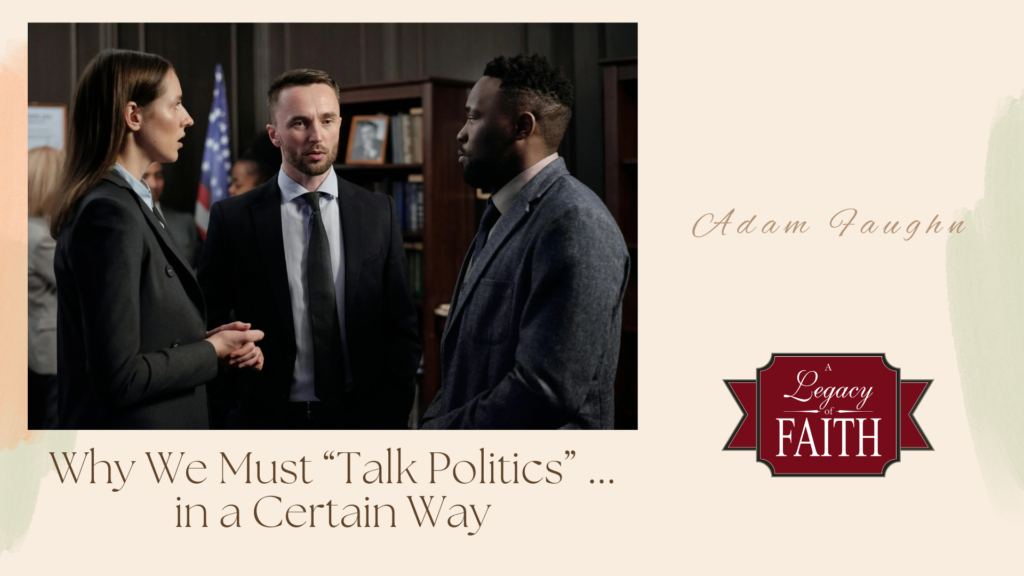Why We Must “Talk Politics” … in a Certain Way
It started rather subtly a number of years ago, and it seems to have started in the political class. It was barely noticeable to many people, but words mean things, and what was conveyed was intentional and has now spread throughout our culture, and even into the church.
It was when people started saying that we have a “freedom of worship” and not a “freedom of religion.” Do you see the difference? To state that we have a freedom of worship confines things, does it not? It says that, if you want to go to a church building and worship, that is fine. By avoiding saying “freedom of religion”–which is what is actually stated in the United States Constitution–the subtle message is that religion should not have any place outside the walls of a church building. It should not really matter in the marketplace, schools, or businesses of the nation.
As that mindset began to grow, though, it started turning in an even stronger direction, because then we began to be told that you cannot mix politics and religion. Further, it became pretty widely stated that preachers should never preach politics.
So, now, we live in a culture where “religion” is reduced to one building and we can only talk about a few things; things that are not “political.”
Now, it needs to be said that, when we come together to worship, we should not be preaching partisan politics. In other words, our goal should never be to elevate one party or one politician above the King of Kings and Lord of Lords. We come together to worship God and not to try to win votes for a candidate for some political office.
However, to say that we cannot talk about politics is unfair to the English language. You see, the word “political” comes from a root that just means “public.” (Think of the polis at the end of “Metropolis.” What do you think that means?) So, when people say that we cannot preach politics, what they are actually saying is that we should not preach or teach on matters that deal with the public!
But that is not an option that is left to us by the Lord. God’s Word governs all of our lives. He has given us “all things that pertain to life and godliness” (2 Peter 1:3). His will is what we want to see done, not only in our own lives, but throughout the world. So, we must preach and teach matters that affect individual lives, but that also are being dealt with at a societal level.
Sometimes, in doing that, we may say something that happens to “match up” with one party’s platform or the position taken by some politician. But it is not because we are trying to win votes; it is simply because, in that instance, a party or political figure happens to agree with Scripture. And it is Scripture that we uphold and follow, not only in our own lives, but, we pray, throughout the “polis.”
So, will we preach on matters that are around our society and are often considered political? Will we talk about such things as abortion, LGBTQ issues, gambling, poverty, or alcohol? Absolutely, and without reservation! But we will not deal with them by researching the Democratic or Republican party platforms. We will preach and teach what God has to say for our lives and for the culture at large.
And we will do that in more places than just our church building. We will live it. We will speak about it (in love; Ephesians 4:15) to neighbors nearby and social media followers throughout the world.
God’s people are not only faithful “in worship.” We are faithful throughout life, everyday and everywhere. As such, we remember that we are to be bringing people to the Lord no matter where we might happen to be, but that requires, in part, Scripture guiding everything we do, every conversation we have, and every action we take.
May we never cower away from being bold but loving in speaking to what the Bible has to say. May we be clear that we are not trying to win people to a party, but to the Lord. And may we always live in such a way that there is no doubt to others that our first priority in life is to “fear God and keep His commandments” (Ecclesiastes 12:13), even if those commandments are not popular in our culture.
AUTHOR: Adam Faughn
